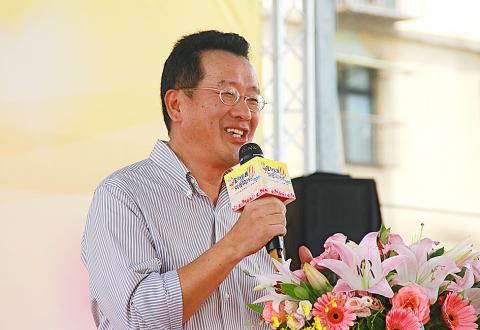Domestic institutions have for the most part taken steps to comply with Europe’s stringent data and privacy rules — the General Data Protection Regulation (GDPR) — that took effect on Friday, Financial Supervisory Commission (FSC) Chairman Wellington Koo (顧立雄) said the same day.
Most domestic financial firms are expected to be able to comply with GDPR as they have made the required preparations, Koo told reporters on the sidelines of a corporate governance event in Taipei.
However, some Taiwanese lenders would have to do more than their peers, Koo said, noting that the six state-run banks that have branches in Europe would have to appoint data protection officers who report to chief privacy officers and commit additional resources toward information and information transmission security.

Photo: CNA
State-run banks subject to the requirement are the Bank of Taiwan (臺灣銀行), Taiwan Cooperative Bank (合庫銀行), Mega International Commercial Bank (兆豐銀行), First Commercial Bank (第一銀行), Hua Nan Commercial Bank (華南銀行) and Chang Hwa Bank (彰化銀行).
Foreign banks with operations in Taiwan should easily be able to adjust to GDPR as they follow protocols set by their head offices, while domestic banks that do not have branches in Europe are still subject to GDPR if their business involve collecting personal data from residents in Europe, Koo said.
The GDPR helps clarify individuals’ rights to the personal data collected by companies around the world for targeted advertising and other purposes. It applies to all users in the EU, regardless of where the companies collecting, analyzing and using their data are located.
Violators could face fines of up to 20 million euros (US$24 million) or 4 percent of their annual global revenue, whichever is greater.
The National Development Council said the finance, e-commerce, airlines and transport industries are expected to see the greatest impact from the new rule.
The council has outlined plans to setup a cross-departmental platform to help Taiwan’s businesses cope with the new rule, Koo said.
It is hoped that financial companies would step up and share their experience with other industries in Taiwan, he said.
Koo also announced that next year financial institutions and listed companies would be required to staff corporate governance positions to help provide their board of directors with information and assistance.
Under the commission’s plans, financial institutions such as banks and insurance companies as well as listed firms with paid-in capital of NT$10 billion (US$333.95 million) or more are required to establish corporate governance posts as of next year.
About 120 companies initially will be subject to the requirement, but the requirement would be expanded to securities brokerages, futures houses and listed firms with paid-in capital of NT$2 billion in the second phase, the commission said.
Additional reporting by AP and staff writer

CHIP RACE: Three years of overbroad export controls drove foreign competitors to pursue their own AI chips, and ‘cost US taxpayers billions of dollars,’ Nvidia said China has figured out the US strategy for allowing it to buy Nvidia Corp’s H200s and is rejecting the artificial intelligence (AI) chip in favor of domestically developed semiconductors, White House AI adviser David Sacks said, citing news reports. US President Donald Trump on Monday said that he would allow shipments of Nvidia’s H200 chips to China, part of an administration effort backed by Sacks to challenge Chinese tech champions such as Huawei Technologies Co (華為) by bringing US competition to their home market. On Friday, Sacks signaled that he was uncertain about whether that approach would work. “They’re rejecting our chips,” Sacks

Taiwan’s exports soared 56 percent year-on-year to an all-time high of US$64.05 billion last month, propelled by surging global demand for artificial intelligence (AI), high-performance computing and cloud service infrastructure, the Ministry of Finance said yesterday. Department of Statistics Director-General Beatrice Tsai (蔡美娜) called the figure an unexpected upside surprise, citing a wave of technology orders from overseas customers alongside the usual year-end shopping season for technology products. Growth is likely to remain strong this month, she said, projecting a 40 percent to 45 percent expansion on an annual basis. The outperformance could prompt the Directorate-General of Budget, Accounting and

NATIONAL SECURITY: Intel’s testing of ACM tools despite US government control ‘highlights egregious gaps in US technology protection policies,’ a former official said Chipmaker Intel Corp has tested chipmaking tools this year from a toolmaker with deep roots in China and two overseas units that were targeted by US sanctions, according to two sources with direct knowledge of the matter. Intel, which fended off calls for its CEO’s resignation from US President Donald Trump in August over his alleged ties to China, got the tools from ACM Research Inc, a Fremont, California-based producer of chipmaking equipment. Two of ACM’s units, based in Shanghai and South Korea, were among a number of firms barred last year from receiving US technology over claims they have

BARRIERS: Gudeng’s chairman said it was unlikely that the US could replicate Taiwan’s science parks in Arizona, given its strict immigration policies and cultural differences Gudeng Precision Industrial Co (家登), which supplies wafer pods to the world’s major semiconductor firms, yesterday said it is in no rush to set up production in the US due to high costs. The company supplies its customers through a warehouse in Arizona jointly operated by TSS Holdings Ltd (德鑫控股), a joint holding of Gudeng and 17 Taiwanese firms in the semiconductor supply chain, including specialty plastic compounds producer Nytex Composites Co (耐特) and automated material handling system supplier Symtek Automation Asia Co (迅得). While the company has long been exploring the feasibility of setting up production in the US to address